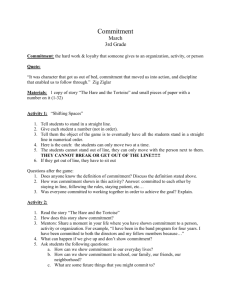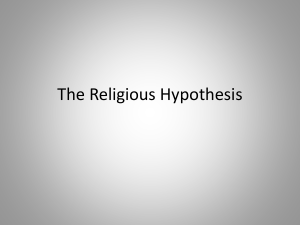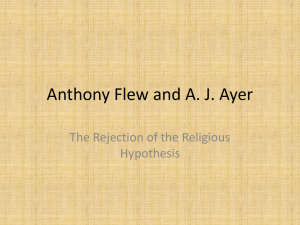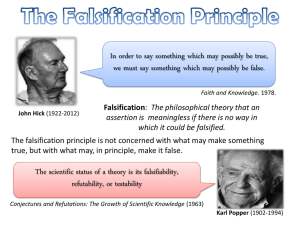Microsoft Word - Religious languagex
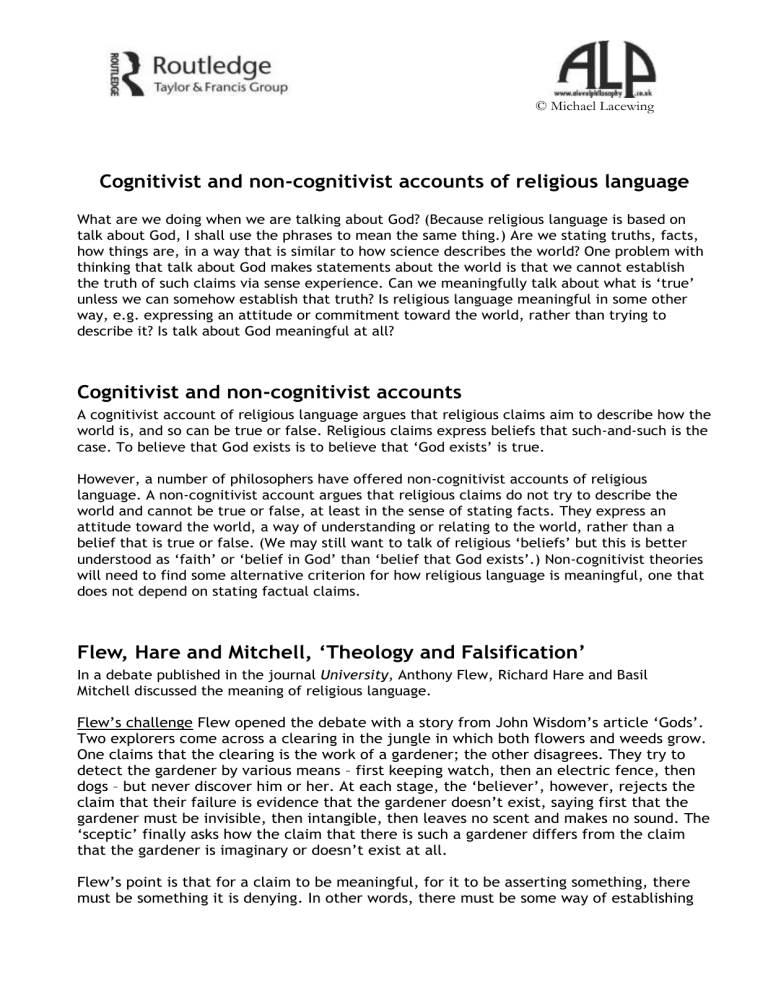
© Michael Lacewing
Cognitivist and non-cognitivist accounts of religious language
What are we doing when we are talking about God? (Because religious language is based on talk about God, I shall use the phrases to mean the same thing.) Are we stating truths, facts, how things are, in a way that is similar to how science describes the world? One problem with thinking that talk about God makes statements about the world is that we cannot establish the truth of such claims via sense experience. Can we meaningfully talk about what is ‘true’ unless we can somehow establish that truth? Is religious language meaningful in some other way, e.g. expressing an attitude or commitment toward the world, rather than trying to describe it? Is talk about God meaningful at all?
Cognitivist and non-cognitivist accounts
A cognitivist account of religious language argues that religious claims aim to describe how the world is, and so can be true or false. Religious claims express beliefs that such-and-such is the case. To believe that God exists is to believe that ‘God exists’ is true.
However, a number of philosophers have offered non-cognitivist accounts of religious language. A non-cognitivist account argues that religious claims do not try to describe the world and cannot be true or false, at least in the sense of stating facts. They express an attitude toward the world, a way of understanding or relating to the world, rather than a belief that is true or false. (We may still want to talk of religious ‘beliefs’ but this is better understood as ‘faith’ or ‘belief in God’ than ‘belief that God exists’.) Non-cognitivist theories will need to find some alternative criterion for how religious language is meaningful, one that does not depend on stating factual claims.
Flew, Hare and Mitchell, ‘Theology and Falsification’
In a debate published in the journal University, Anthony Flew, Richard Hare and Basil
Mitchell discussed the meaning of religious language.
Flew’s challenge Flew opened the debate with a story from John Wisdom’s article ‘Gods’.
Two explorers come across a clearing in the jungle in which both flowers and weeds grow.
One claims that the clearing is the work of a gardener; the other disagrees. They try to detect the gardener by various means – first keeping watch, then an electric fence, then dogs – but never discover him or her. At each stage, the ‘believer’, however, rejects the claim that their failure is evidence that the gardener doesn’t exist, saying first that the gardener must be invisible, then intangible, then leaves no scent and makes no sound. The
‘sceptic’ finally asks how the claim that there is such a gardener differs from the claim that the gardener is imaginary or doesn’t exist at all.
Flew’s point is that for a claim to be meaningful, for it to be asserting something, there must be something it is denying. In other words, there must be some way of establishing
that it is false, something that leads us to withdraw the claim. (Flew is arguing that empirical assertions must be cognitive to be meaningful. He doesn’t present a general theory of meaning.) If we know what the claim rules out, we can understand what the claim means. But if there is nothing it rules out, then the claim is not a genuine attempt to say something true. For example, the theory of evolution by natural selection rules out aliens coming to Earth and demonstrating that they had planted ‘fossils’ (which they had made) for us to find. If this happened, we would give up the theory of evolution.
Likewise, if ‘God exists’ is a real claim, then there should be some possible experience that would lead us to accept that it is false. Something should be able to ‘count against it’, e.g. the existence of evil. If you are not prepared to accept that anything could show that God doesn’t exist, then saying ‘God exists’ states nothing at all. Flew objects that many religious believers refuse to accept that anything could show that God doesn’t exist. Instead, they keep
qualifying what it means to think that ‘God exists’. For example, they might argue that the existence of evil only shows that we don’t understand God’s plans
Hare’s ‘bliks’ Hare rejects Flew’s form of cognitivism. Religious beliefs are not like assertions that can be shown to be true or false. Instead, they are part of someone’s attitude toward or view of the world (or some aspect of it), which Hare calls a ‘blik’. For example, someone may be paranoid that university lecturers want to murder him. He doesn’t count anything as evidence against this view (this is a normal feature of delusions). But the difference between his view and the view of the rest of us is meaningful, important and makes a difference to how we live. Another example is someone who trusts the properties of steel or the continued ability of a road to support cars v. someone who doesn’t; or someone who thinks everything happens by chance v. someone who believes in laws of nature. A disagreement in bliks can’t be decided by empirical experience, and two people who disagree may not assert anything different about what to expect from experience. Yet the disagreement is meaningful. To hold that God exists is a blik, as is the view that God does not exist.
It is unclear whether Hare thinks religious language is cognitive or not. On the one hand, there is a truth of the matter (whatever one believes) whether university lecturers are trying to kill you or not or whether everything happens by chance or not. So it seems bliks can be true or false, which suggests that they are cognitive. On the other hand, because bliks can’t be falsified, Hare claims that they work more like attitudes or commitments than beliefs.
This would suggest that they are non-cognitive. But notice that any empirical claim which would normally be held as a (cognitive) belief (about the motives of university lecturers, the properties of steel, the explanations of science) could be held as a (non-cognitive) blik. The difference is how the person thinks about it.
When someone holds a blik about some claim, while the rest of us just hold falsifiable beliefs, we tend to think that the person is irrational in some way. Does Hare’s analysis entail that religious believers are irrational? If not, why not? Hare doesn’t say. As Flew objects, Hare’s theory that religious belief is a blik is very unorthodox and fails to make sense of what religious believers actually say. If religious claims aren’t assertions, then a claim such as ‘You ought to do it because it is God’s will’ becomes ‘You ought to do it’ (since ‘it is God’s will’ is not an assertion, but the expression of a blik). But this is not what religious believers mean.
Mitchell’s response Mitchell accepts Flew’s cognitivism and his argument that for an empirical claim to be meaningful, we must allow something to count against it. But he disagrees with
Flew’s claim that an assertion is only meaningful if we are willing to withdraw it in light of certain experiences. Suppose there is a war in which someone’s country has been occupied, and he joins the resistance movement. One day, this partisan meets a stranger who tells him that he is the leader of the resistance. The partisan is very impressed by the stranger and trusts him deeply. However, the stranger later acts in ambiguous ways, sometimes seeming to help the resistance and other times apparently helping the enemy. But the partisan, because he trusts the stranger, continues to believe that the stranger is on the side of the resistance, and so must have some good reason for his ambiguous behaviour.
If the partisan refused to count the ambiguous actions of the stranger as evidence against the claim that the stranger is on the side of the resistance (as in the case of Hare’s bliks), this would be merely irrational. Such a view would empty religious language of its meaning. But on the other hand, the partisan is not rationally required to simply relinquish his view. His trust sustains his belief in the stranger, and we cannot say, in the abstract, just how much evidence against his belief is needed before his belief becomes irrational.
Likewise, religious language makes assertions, but these claims are not simply provisional hypotheses, to be discarded in the face of contrary experiences. They involve a certain commitment as well. A claim can be meaningful without us being able to say what experiences would lead us to relinquish it, as long as we recognise that experiences can count against it.
Flew accepts Mitchell’s response. However, he argues, in essence, that the logical problem of evil is insoluble. We are unable to find any justification of evil that is compatible with an omniscient, omnipotent, supremely good God, and the only way out for religious believers is to qualify what they mean by God or his purpose for us. We can object, however, that this is now no longer an argument about whether religious claims are meaningful, but about whether they are either true or coherent.

